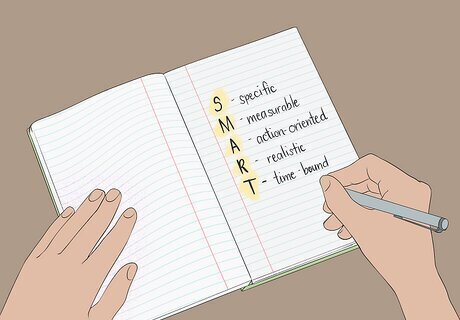
views
X
Trustworthy Source
American Psychological Association
Leading scientific and professional organization of licensed psychologists
Go to source
These traits are obtainable if you do not currently have them, by developing and sharpening your own industrious traits.
Becoming More Efficient

Plan ahead. One of the best ways to be more efficient, whether you're in school or working, is to plan ahead. Don't just plan for the things you know will happen (though you should obviously do this as well); try to anticipate the workload and needed time. Set aside extra time in case you need to stay late at work, or take projects home with you to finish over the weekend. Manage your time wisely. If you make sure that your immediate tasks are taken care of in a timely manner when you are not overloaded, you won't fall behind when something new comes up. Prepare supplies and plans in advance as much as possible. If you can make preparations for something the night before instead of the morning of, you'll be far more ready for the known and anything else the day might throw your way.

Make lists of items "to do." When you get involved in a project, you might forget about other responsibilities or obligations of the day. This might be as simple as forgetting to send an email response, or as serious as missing an important deadline. The best way to stay on top of your workload, no matter what profession or area of studies you're in, is to make lists, update progress and check items off as you accomplish them. Make separate color-coded lists with different colored paper or ink for each list. Title them by day, week and month: "Get Done Today," "Finish This Week," and "Complete by Month's End." Combine parts of your goals for efficiency. For example, instead of writing “get supplies for X project,” “get supplies for Y project” and “get supplies for Z project,” you could write “get supplies ordered for X, Y, and Z projects.” Limit your list to three items. Many successful people limit to do lists to ensure that they do not try to do too much or become overwhelmed. Consider limiting your list to no more than three items. Make sure that you prioritize important tasks. Larger or more difficult tasks may take longer to complete, but you'll feel better about yourself for completing these big items. For example, instead of adding “register domain name,” you might add “build new website.” Write your to do list the night before. That way you can start your day knowing what needs to be done, how and when.

Delegate work and share tasks. Depending on your job description, your personality type, and available workers with complementary jobs, you may be able to work together with others. Though you might feel like it is simpler to do everything on your own, involve the others. Some jobs require you to work alone, but more often it's a matter of being willing and able to let go of some responsibilities that others should do. You may think that makes you an indispensable worker, but depending on the situation, it could actually be counterproductive and distracting. You may be tempted to try and do everything on your own, but that can actually waste a lot of your time, as well as your company's time when others could to do their part. Teaching your subordinates and coworkers how to share some of the more time consuming tasks you perform each day can free up your time to focus on the bigger challenges. Don't use your new found free time to surf the internet or take extra-long coffee breaks. Instead, manage your time by planning ahead and focusing on the weekly and monthly tasks you need to complete.
Developing Perseverance

Develop specific, measurable goals. Researchers have found that some of the most accomplished men and women around the world shared a common trait: grit. Grit, in this case, is defined as an unwavering passion for long-term goals, as well as an ability to remain committed to those goals in spite of failure and adversity along the way. The best way to set yourself up for success is to create S.M.A.R.T. goals: Specific, Measurable, Action-oriented, Realistic, and Time-bound. Be specific in creating the end point of your goal. Ask yourself what it is that you hope to ultimately achieve. Make the goal measurable. Consider how you will know when it has been achieved, and how you will measure incremental success along the way. Create steps to meet your goal that are action-oriented. Your goal must have a well-defined strategy for achieving your goal, whether it's through weekly progress or day-to-day efforts. Consider whether your goal is realistic. Don't create an unrealistic expectation for yourself, but make sure your goal does push you to work hard. Put a time frame on your goal. You should set an end point that will challenge you while still being achievable, as well as intermittent timelines for minor accomplishments along the way.

Visualize your success. Experts agree that visualization techniques are an effective way to bring about positive change in your own life. It won't work like magic, but when you visualize your own success, it can give you the confidence and motivation to make your dreams a reality. Picture your problems being solved, your presentation going well, your promotion going through - whatever it is that you want, imagine it already happening. Use that visualized image again and again. Any time you feel yourself giving up, return to that image and let it motivate you even more.

Resist the urge to procrastinate. Procrastination will quickly kill your will to persevere. If you start giving in to procrastination, you can quickly feel like all of your time is spent trying to catch up to where you should be. Take action when you notice yourself struggling to stay motivated. That is the time you need motivation the most. Think about how much more stress you will experience if you put off the work that needs to be done. Remember that procrastinating won't reduce your workload, and it won't even really buy you more time. If anything, it will make managing your time more difficult. Try making a calendar and imposing deadlines on yourself. This might help you stick to a schedule and avoid putting off important work.

Take pleasure in your effort. For many people, perseverance is equated with pain and suffering. It's considered an uphill struggle that is difficult and often has no end in sight. The key to staying motivated is to find pleasure in your efforts, even when they don't seem to be paying off. Try to reframe your mindset about work and effort. See it as an opportunity to increase your confidence and better yourself. Henry Ford took great pleasure in his efforts, even when they weren't paying off. So do many people who stick to a rigorous exercise regimen, even when they're not losing any weight. Even if you're not seeing results right now, you're improving your skill set, expanding your strengths and knowledge, and making progress towards your goals.
Cultivating Strong Work Habits

Be punctual. Whether you're a student or you're in the workforce, being punctual is important to success. Tardiness can cause you to miss important meetings, become left out of significant decisions, and may ultimately cost you your job or cause you to fail a class. Don't get sidetracked with distractions when you're preparing to leave for work or school. Develop a routine and stick to it, and don't deviate from your route to work/school unless there's an urgent emergency. Calculate the distance it will take you to get to work/school on an average day, with and without traffic. One way to do this is by using an online mapping service (like Google Maps, for example) to see how long your commute takes without traffic vs. with heavy traffic. Plan on leaving with enough time to take traffic into account. If your commute takes 25 minutes without traffic and 35 to 40 minutes with traffic, aim to leave 45 to 50 minutes early. The worst thing that will happen if you leave too early is that you'll arrive early and have time to grab coffee. If you leave too late, though, it could cost you your job.

Eliminate or reduce distractions. Every day you're faced with countless choices, but one of the choices that may be most difficult for some people is the choice between diligent work and a fun, short-term distraction. While distractions are good in moderation to relax and "unplug" your brain, they should be restricted to evenings and weekends so that your work productivity is not affected. Think about how much time you waste on a given day checking your social media, like Facebook and Twitter. Spending 10 minutes on Facebook every hour of an eight-hour workday adds up to 80 minutes of time wasted online. Distractions don't just end with social media. You probably spend a lot of time responding to text messages, checking your personal email, and reading articles on your phone or computer. There's nothing wrong with using things like social media in moderation, but if it's affecting your work productivity you may need to cut back. Try turning off your phone (including the vibrating feature) so that you won't get any new notifications. Then force yourself to resist checking your social media, email, or text messages until your lunch break.

Be more professional. Professionalism may mean different things for different people. Ultimately, though, your version of professionalism should place the needs of your employers and your professional responsibilities over your own personal interests. Ignore the little things at work that upset you. These minor squabbles aren't worth getting angry over, and if you react with anger it will reflect very poorly on you as an employee. Be more self-disciplined and keep yourself motivated. When you were a child you had your parents to remind you to get back to work, but you won't have those reminders as an adult. Stay above the gossip that circulates through your workplace. Participating in it or trying to listen in on it will only distract you, frustrate you, and cause you to resent or judge your coworkers. Show kindness and respect to everyone you work with. You don't have to like everyone, but you do have to show the same basic courtesy to everyone for the good of the company. Make sure your personal attitude is professional, appropriate, and contributes to a healthy work environment.

Develop a healthy morning routine. It may seem strange to think of your morning routine at home being related to your work productivity, but the two are inseparable. How you treat your body and mind in the morning before you come to work sets the pace for your entire day, and can either sabotage your efforts or set you up for success. Your morning routine can help you get motivated, as you'll learn to recognize that it's time to switch gears and get productive. Establish some type of mental signal that it's time to start your day. It might be a morning meditation, a workout session, or simply drinking a glass of cold water. Try getting some light exercise in the morning. If you don't have time to hit the gym or go for a three-mile run, it can be as simple as walking your dog around the block instead of just letting him out in the yard. Try to leave your home each morning in as calm a mood as possible. Try listening to relaxing music on your drive, if you're able to do so without distraction. Take a moment to breathe deeply and consciously before you walk from your car or train stop to your place of employment to help de-stress from your commute. Take slow, deep breaths through your nostrils, down into your lower belly, and back out. Focus on the sensation of air passing through your nostrils and your belly rising and falling to shed some of your stress and anxiety.

Have restful evenings. Just as your morning routine sets the pace for the rest of your day, your evening routine could set the tone for what your morning will be like. Going to bed stressed, not getting enough sleep, or spending too much time in front of the television at night can affect how well-rested you are in the morning. Generally speaking, most adults need between seven to nine hours of sleep each night, though some may need 10 to 11 hours. Instead of binge-watching your favorite TV shows at night, try turning the television off and doing something relaxing before bed, like meditation or reading. Stay off your electronic products at night, or at least keep them out of view. The glare from your phone, tablet, or computer screen can disrupt your body's natural melatonin production, making it harder for you to get to sleep. Take the time to do things you enjoy at home and on the weekends. You'll feel more relaxed, rejuvenated, and ultimately more fulfilled. Make sure you eat a healthy, balanced diet as well. Eating junk food in excess, drinking too much caffeine, or drinking too much alcohol at night can all affect your mental and physical health, and may affect your ability to get a restful night's sleep as well.
Communicating Effectively

Take a moment to calm down. Communicating effectively is difficult when you are upset or stressed. You may end up having a hard time expressing yourself or you may overreact to something. Before you have a conversation with someone, take a moment to check how you are feeling. If you are feeling upset or stressed, then take a moment to calm yourself down before having a conversation. Try taking a few deep breaths. Make yourself a cup of herbal tea. Visualize a pleasant place for a few minutes. Go for a brisk walk.

Focus on the conversation. It is also important to stay focused and listen when you are talking to someone. If you are looking at your phone, thinking about something else, or preoccupied with what you are going to say next, then you may miss important points that the other person makes and have to ask him or her to repeat what he or she just said. This can lead to lost time and frustration for the other person. Before you start a conversation, put away your cell phone, focus your eyes on the speaker, and pay attention to what the speaker is saying. If you get confused about something the speaker says, it is okay to ask a question. For example, you can say something like, “Can you clarify what you meant when you said ___?”

Work on your body language. How you hold yourself and the expression of your face can also have an impact on the amount of information that you retain. Make sure that you are showing that you are listening as much as you are actually listening. You can demonstrate that you are listening by: Making eye contact. Nodding and responding with appropriate facial expressions. Facing the speaker and leaning in slightly.

Be more assertive. Assertive speech is important for effective communication. If you use passive rather than direct communication, then you risk being misunderstood or unheard. By stating your thoughts and feelings in clear, direct terms, it will be easier to get your point across. Being assertive does not require you to be aggressive or mean. The goal is for you to be heard and understood by others. Keep in mind that your opinion is as important as everyone else’s opinion. Don’t be shy to speak up if you have an idea. Be willing to say “no” if you feel overwhelmed or if you just don’t want to do what someone is asking you to do.

Use simple speech. Another way to ensure that you are communicating effectively is to use simple speech rather than complex speech. Before you speak, try to think of the simplest way for you to express yourself. Consider your audience and think about what would help them understand the point you are trying to make. For example, you might need to find ways to communicate without using jargon or technical speech if your audience might not understand those terms. You also might need to give examples, make comparisons, or repeat key ideas.



















Comments
0 comment